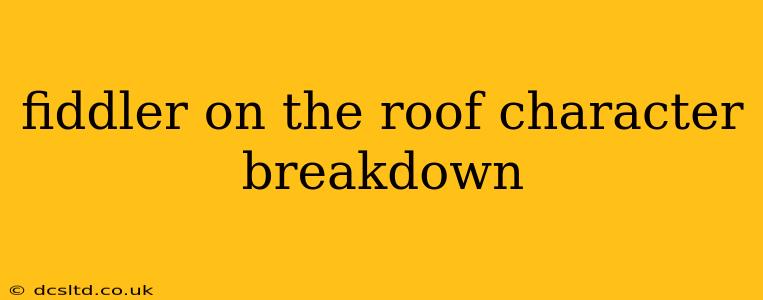Fiddler on the Roof, a timeless classic, boasts a vibrant cast of characters whose struggles and triumphs resonate deeply with audiences worldwide. This in-depth character breakdown will explore the key players, examining their motivations, relationships, and contributions to the story's enduring appeal. We'll delve into the complexities of their personalities, revealing the nuances that make them so compelling. This isn't just a list; it's an exploration of the human heart within a vibrant, historical setting.
Tevye the Milkman: The Heart of the Story
Tevye, the central character, is a poor but proud milkman living in the small Jewish village of Anatevka in Imperial Russia. He's a man of deep faith, clinging to tradition in a rapidly changing world. His unwavering belief in God, often expressed through his conversations with Him, is both humorous and poignant. He grapples with the tension between his traditional values and the evolving desires of his daughters, creating the central conflict of the musical. Tevye's strength lies in his love for his family, even as he struggles to understand and accept their choices. His humor and resilience, in the face of poverty and societal shifts, make him a universally relatable and endearing protagonist. He is the “fiddler on the roof,” representing the precarious balance of life and tradition.
What are Tevye's main struggles?
Tevye's primary struggle is reconciling his deeply held traditions with the changing world around him. He fights to maintain his faith and cultural identity while his daughters challenge those very traditions by choosing their own spouses. This internal conflict is the driving force behind the plot, making him a character of both immense strength and vulnerability. He struggles with poverty, the threat of anti-Semitism, and the fear of losing his family's connection to their heritage.
Golde: The Steadfast Matriarch
Golde, Tevye's wife, is the pragmatic counterpoint to his sometimes stubborn adherence to tradition. While sharing his faith, she's less romantic and more focused on the practicalities of survival and ensuring the future of her family. She is a woman of quiet strength, supporting her husband while also asserting her own opinions. Her relationship with Tevye is a complex dance between love, frustration, and mutual respect. Golde's character highlights the strength and resilience of women in a patriarchal society, subtly challenging traditional gender roles. Her acceptance of change, while initially reluctant, adds depth and realism to her portrayal.
How does Golde's character evolve throughout the play?
Golde's evolution lies in her gradual acceptance of her daughters' choices, despite her initial reservations. She moves from a position of rigid adherence to tradition to one that acknowledges the necessity of change and compromise. This transformation underscores her ability to adapt and shows her love for her daughters outweighs her adherence to traditional match-making.
The Daughters: Breaking with Tradition
Tevye's five daughters, each with their own distinct personality, represent the changing times. Their individual stories highlight the clash between tradition and modernity.
- Tzeitel: The eldest daughter, Tzeitel, is initially betrothed to the much older butcher, Lazar Wolf. Her courageous defiance of this arranged marriage showcases her growing independence and the strength of her love for Motel.
- Hodel: Hodel, the second daughter, exemplifies idealism and selfless love. Her romance with Perchik, a revolutionary student, embodies the intellectual awakening of the younger generation.
- Chava: The youngest daughter, Chava, represents the most radical departure from tradition. Her marriage to Fyedka, a non-Jewish man, ultimately results in her exile from the community, showcasing the painful consequences of challenging deeply ingrained cultural norms.
What role do the daughters play in the overall narrative?
The daughters serve as catalysts for change, forcing Tevye and the community to confront the limitations of their traditions. Their individual stories represent various aspects of societal evolution and the complexities of choosing between love and loyalty. Their choices, though individually different, illustrate the inevitable progression away from rigid adherence to a life lived entirely according to tradition.
Other Notable Characters
Beyond the central family, several other characters contribute significantly to the story's richness:
- Motel: A poor but kind tailor, Motel is deeply in love with Tzeitel and represents the hope for a better future.
- Perchik: A charismatic revolutionary student who ignites the intellectual curiosity of the younger generation.
- Lazar Wolf: A wealthy but somewhat unappealing butcher who is initially betrothed to Tzeitel.
- Yente: The village matchmaker, a humorous and somewhat gossipy character who plays a crucial role in the matchmaking process.
Conclusion
Fiddler on the Roof's enduring appeal lies in its exploration of universal themes: faith, family, tradition, and the inevitable march of progress. The characters, each with their own strengths and flaws, represent the complexities of human experience. Their journeys create a story that both entertains and deeply moves, leaving audiences reflecting on the enduring power of love, family, and the courage to navigate a changing world.
